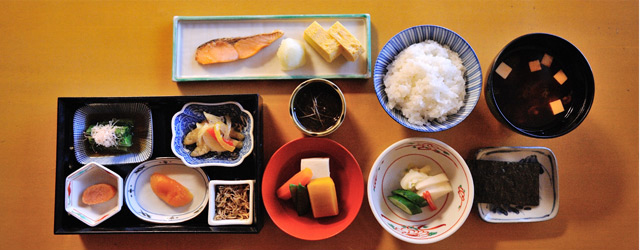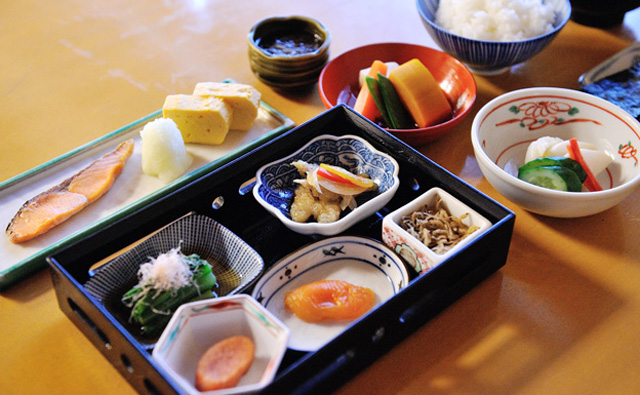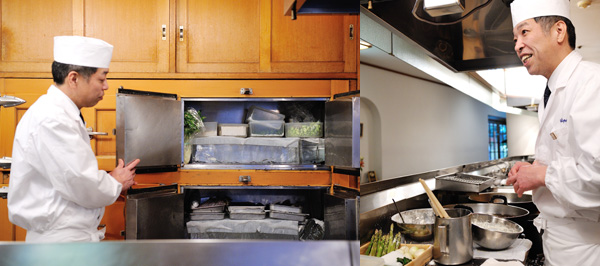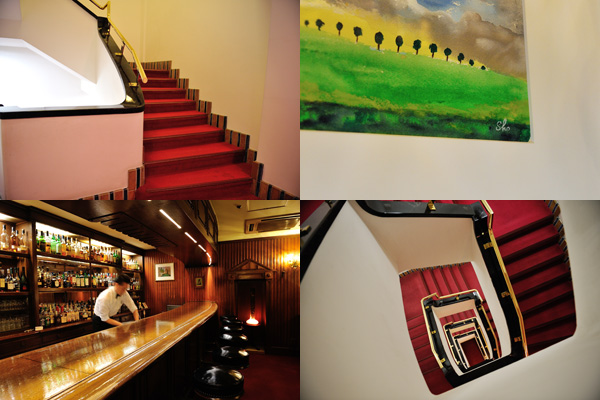Japanese Breakfast: The Ideal Japanese Breakfast Loved by Literary Masters
Mar 15,2013
Japanese Breakfast: The Ideal Japanese Breakfast Loved by Literary Masters
Mar 15,2013

A morning meal loved by literary giants
-Yamanoue Hotel, Chiyoda-ku, Tokyo-
Kanda-Surugadai is one of Tokyo’s largest student havens — so many reside here in fact, that the district was dubbed “Japan’s Latin Quarter” in the 1960s. Flanked by Kanda-Jimbocho’s clusters of used book stores and publishing houses, the area pulses with its own sophisticated, tweedy-intellectual vibe.
Overlooking this scene, perched alone atop a sharp elevation is the aptly named Hilltop Hotel — Yamanoue Hotel in Japanese. In the 60 years since its founding in 1954, a host of literary giants have used this renowned hotel as their regular haunt. And it was here where one of them proposed what became a uniquely Japanese morning meal.

Kawabata Yasunari, Dan Kazuo, Yoshida Kenichi, Tamura Ryuichi, Yoshiyuki Junnosuke, Mishima Yukio, Yamaguchi Hitomi, Tokiwa Shinpei … transcribing the names alone is dizzying. Indeed, much of the history of Japanese postwar literature could be told just by mentioning the novelists, poets, playwrights, and other scribes who were enamored with the Hilltop Hotel. But what was it about this snug, 70-room hotel that captivated them?
The answer, one suspects, is encapsulated in the ad copy that founder Yoshida Toshio composed and ran in the monthly magazine Bungei Shunju. “Although somewhat old and drab, the Hilltop Hotel is a hotel for the cultured who demand tranquility and taste.” What the hotel may lack in luxurious furnishings and ornate decorations, it more than makes up for with its refined, yet modest, urbane charm.


The writer Ikenami Shotaro (1923 – 1990) was a frequent guest of the hotel. One of Japan’s finest historical novelists — he penned such great works as Kenkaku Shobai and Onihei Hankacho — Ikenami was also a recognized food bon vivant. One morning at the hotel, Ikenami hit upon the idea for the Japanese breakfast pictured above.
“The story I heard is that it began sometime in the late 1980s when Ikenami told the then-head chef: ‘I want to taste a little of everything’”, recounts Shimanuki Shigeru, the current head chef who has been working at the hotel for 20 years.
What arrived on Ikenami’s table was eleven side dishes — each small enough to eat in one or two bites — arranged in demurely decorated bowls and plates. The dishes may look toy-sized, but each is painstakingly crafted and prepared every day in time for the 7 a.m. breakfast opening hour.
Today’s eleven items are grilled salmon, rolled omelette, boiled mizuna greens, fried Japanese smelt marinated nanbanzuke style, Hakata spicy cod roe, kanroni (candied) apricot, dried baby sardines with Japanese pepper simmered in soy sauce, mozuku seaweed, simmered vegetables, pickled vegetables, and nori seaweed. The meal is rounded out with red miso soup and rice.
“We generally keep the seasonings light because there are so many dishes. We always include vinegared dishes and a kanroni-style or other sweet dish.”
The menu is planned with deliberate attention to the colors and presentation, the texture of each dish, and the meal’s overall nutritional balance. Preparing such a meal is a tall task, but the near-perfection evident in this Japanese breakfast course symbolizes the hospitality the Hilltop Hotel is celebrated for. Moreover, the eleven-course breakfast — which features a vast assortment of ingredients, from the seas to the mountains — is no less than a gift from Japan’s storied culture of culinary innovation.
“We can’t serve the same course to guests staying for consecutive nights, so we change the fish, boiled vegetables, simmered vegetables, and other dishes every day. Many guests order the breakfast course through room service as appetizers.”
I leave the rice and the red miso soup for last and have a beer first. It’s at that point that the eleven side dishes transform into appetizers. It’s a luxurious way to start the morning, and I’m truly envious.
The Japanese breakfast course is served at Yamanoue Tempura & Japanese Cuisine, a restaurant famed for its tempura. Their wooden refrigerator, kept chilled by ice, is packed with fresh seafood and vegetables. What sets their tempura apart is how the ingredients are coated in a delicate batter and deep-fried in a blend of two types of sesame oil. If you ever get the opportunity, definitely try this quintessential Edomae tempura.


Let’s take a peek around the hotel proper.
Room 401, Ikenami Shotaro’s room of choice, is a peculiar space, having a Western-style double bed and a writing desk placed directly on the tatami. As the photo shows, Ikenami ordered a low Japanese-style table and legless chair to be placed in the room. Squarely poised at this table in this chair, Ikenami read through submissions nominated for the Naoki Prize and other literary awards, drew illustrations, and wrote essays. For several years before his death, he spent three nights a month in this room. It seems he used his hotel visits to complete comparatively lighter tasks, while working on his novels at home.
Besides work, he also sometimes came to the hotel for a different, charming reason.
“Like years past, I stayed at the Hilltop Hotel for three or four days during the Bon Festival because my family implored me to ‘please get out of the house’, as most of the shops were shut during this time.”
— Ikenami Shotaro’s Ginza Diaries (Unabridged) (Shinchosha)
Ikenami would stay at the hotel to give his family a break: A most mature consideration.

Immediately to the left of Room 401 is Room 403. This suite with an attached garden was a favorite of Yamaguchi Hitomi (1926 – 1995). It is said that he wrote his masterpieces Blood Relations (1979) and Family (1983) among others in this room.
The Hilltop Hotel abounds with anecdotes like these. The first-floor lobby is decorated without fanfare with paintings by Ikenami and Yamaguchi, and noted writers still frequent the Non Non bar, which has been in business since the hotel’s inception.
The hotel is the perfect retreat to hole up in, away from Tokyo’s eternal hubbub. Staying here, you feel yourself become immersed in a kind of stately ambience, informed by the weight of history. And in the morning, after partaking in the hotel’s signature Japanese breakfast, you feel your yourself standing just that much taller. This is my kind of escape.
